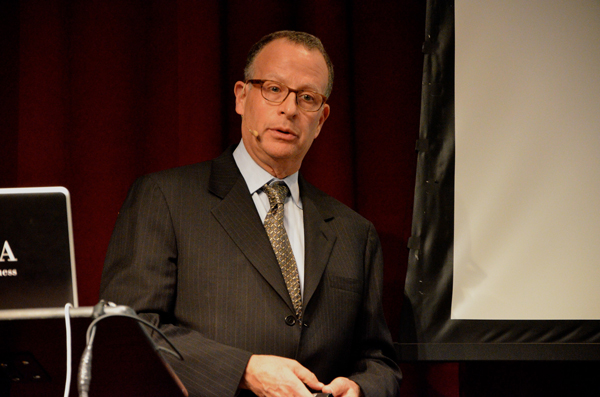Federal Tax Expert Pushes for Bigger Government
“I want to encourage each of you to become more involved in the role of government today and what we can accomplish with a larger government in place,” said Edward Kleinbard to a packed audience of Loyola Marymount University business students, faculty, staff and alumni.

Kleinbard spoke at LMU as part of the Center for Accounting Ethics, Government, and the Public Interest’s Distinguished Speaker Series. He is the Johnson Professor of Law and Business at USC’s Gould School of Law and a Fellow at The Century Foundation. Prior to these appointments, he served as Chief of Staff of the U.S. Congress’s Joint Committee on Taxation.
In his presentation, Kleinbard highlighted several themes from his new book titled “We Are Better Than This: How Government Should Spend Our Money.” In the book, he explains how the public's preoccupation with tax policy alone has obscured any understanding of government's ability to complement the private sector through investment and insurance programs that enhance the general welfare and prosperity of our society at large.
More Government
“Both conservatives and progressives get it wrong,” says Kleinbard. “We need more government, not less. We must focus on cut and dry issues.”
He says a bigger, more muscular government is desirable, responsive and necessary for the following reasons:
- Desirable because the national economic pie gets bigger when government complements the private sector through well-designed investment and social insurance.
- Responsive to soaring income inequality.
- Necessary because government investment and insurance are the only ways to address incomplete private markets and to ensure inequity of opportunity.
The Inequality Issue
Rising inequality is very real in our nation. The U.S. gap between rich and poor is wide. There’s a clear correlation between school test scores and median home prices. In other words, the government spends more on public education for rich kids than poor kids. The U.S. also accepts much more poverty than other countries. According to Kleinbard, regressive taxes can fund progressive fiscal systems.
Two Percent Solution
Kleinbard proposes a two percent solution: increasing federal government spending by two percent of GDP would open many opportunities.
“When we choose how government should spend and tax, we open a window into our national fiscal soul,” said Kleinbard.
A few other revelations from his talk:
- Government exists to spend, not to tax; taxation is just how we finance that spending.
- Government investment generates large positive returns, just like private investment.
- We should focus on opportunities net of their costs.
- Our largest asset class is ourselves: our lifetime incomes and satisfaction are directly tied to our investments in ourselves through education.
- Government has to be the investor; private markets cannot invest in people.
The next Center for Accounting Ethics lecture is scheduled for Wednesday, March 4th. Rick Fleming, the first director of the Office of the Investor Advocate at the U.S. Securities and Exchange Commission, will speak as part of the Distinguished Speaker Series.